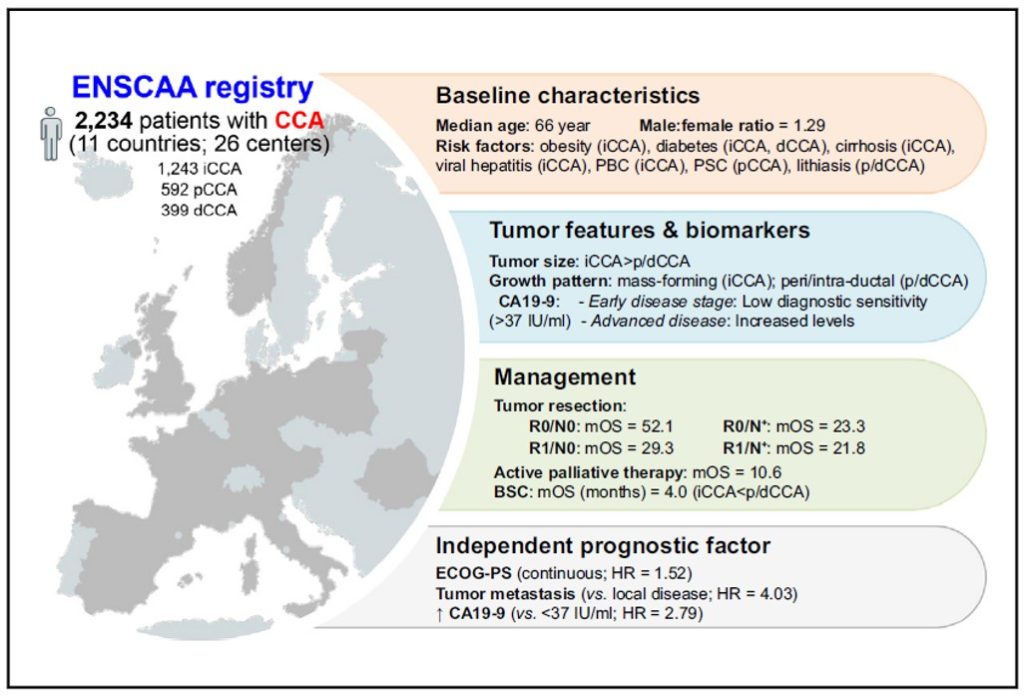Initiative to map the Cholangiocarcinoma landscape in Europe will help improve patient outcomes

Scientists advocate for education programmes to raise awareness and improve early diagnosis, survival, and quality of life of cholangiocarcinoma (CCA) patients in the largest and most complete multicentre study of CCA, published in the Journal of Hepatology.
Amsterdam, February 12, 2022 – Bile duct cancer, also known as cholangiocarcinoma (CCA), is a rare cancer often diagnosed only at an advanced stage. A comprehensive analysis of diagnostic, prognostic, and therapeutic aspects of over 2,200 patients in Europe now provides a valuable knowledge base for raising awareness and managing CCA to improve outcomes. This study is reported in the Journal of Hepatology, the official journal of EASL, published by Elsevier.
In 2015, the European Network for the Study of Cholangiocarcinoma (ENS-CCA) was founded with the aim of setting up a pan-European interdisciplinary cooperative network to address the CCA problem at basic, translational, and clinical levels. Its first initiative was the creation of the Clinical ENS-CCA Registry in 2016 to describe in detail the natural course of CCA in Europe, determine potential risk factors, improve the current classification system, investigate early and non-invasive accurate tumour biomarkers for diagnosis and to estimate prognosis, compare the effectiveness of therapies, and select patients for clinical trials.
Caption: Scheme of patients with CCA in the ENS-CCA registry, showing baseline characteristics (including risk factors), tumour features and biomarkers, management, and independent prognostic factors for the three sub-types of CCA: iCCA (intrahepatic); pCCA (perihilar); and dCCA (distal). (Credit: Journal of Hepatology).
CCA is a rare cancer, but its incidence is increasing worldwide, and we need to stop treating it as an orphan disease. Although CCA constitutes a major challenge for clinicians, scientists, national health systems, and society, there is a lack of coordinated multidisciplinary pan-European studies. We therefore used the ENS-CCA registry to gather vital information,
explained lead investigator Dr Jesus M. Banales, Professor Ikerbasque at Biodonostia, University of Navarra and CIBERehd, Spain.
In the most comprehensive international observational study to date, investigators evaluated the natural course of histologically-proven CCA in more than 2,200 patients who were diagnosed between 2010 and 2019, and whose details were included in the ENS-CCA registry. The data was contributed by 26 referral hospitals in 11 European countries. At diagnosis, 42.2% of patients had local disease, 29.4% had locally-advanced disease, and 28.4% had metastatic disease. They compared general and tumour-type specific features at diagnosis, risk factors, biomarker accuracy, as well as the similarities and differences between the three CCA subtypes based on the latest World Health Organization classification according to their anatomical origin (intrahepatic, perihilar, or distal), and a comparison of the patient management and outcomes.
The results suggest that the location of CCA tumours along the biliary tree is associated with different risk factors and tumour features. Diagnoses call for invasive confirmations by biopsy or cytology, as blood tests for tumour biomarkers show low sensitivity in early stages. Surgical resection remains the only potentially curative therapy, although cure is unlikely with involvement of resection margins or lymph node invasion. Investigators noted that chemotherapy increased patients’ life expectancy compared to patients receiving best supportive care. They also noted that deterioration of the patient’s performance status (ECOG), the presence of metastases, and increased levels of the tumour marker CA19-9 independently affected the outcome.
A comparative analysis of risk factors of the three different locations of CCA tumours revealed some potential lifestyle-related risk factors such as alcohol excess, smoking, overweightness/obesity, diabetes, etc. These are highly prevalent in Europe and could predispose at-risk individuals to the development of CCA.
In conclusion, our study provides a comprehensive analysis of diagnostic, prognostic, and therapeutic aspects of the complex CCA landscape. The results showed that CCA is mostly diagnosed at an advanced stage, a significant proportion of patients fail to receive any cancer-specific therapy, and the prognosis is dismal. Therapeutic options are limited. Accordingly, awareness campaigns and education programmes aimed to prevent lifestyle-related risk factors, and new techniques for early detection of CCA in high-risk populations are urgently needed in order to decrease cancer-related mortality. Our findings represent valuable knowledge for future comparisons with new targeted therapies and the design of next-generation personalised clinical trials,
commented Dr Banales.
CCA is a highly heterogenous and aggressive malignancy responsible for around 2% of all cancer-related deaths globally each year. It is often diagnosed when it is already advanced, making it difficult to treat successfully. Currently it represents approximately 15% of all primary liver cancers and 3% of all gastrointestinal cancers worldwide.
World Cholangiocarcinoma Day, on 12 February this year, was established by the Global Cholangiocarcinoma Alliance (GCA), which has united to establish a global voice about CCA through community collaborations. The GCA has a shared vision to raise awareness of CCA to improve prevention, survival, and quality of life of CCA patients globally.
***
Notes for editors
The article is “Cholangiocarcinoma landscape in Europe: Diagnostic, prognostic and therapeutic insights from the ENSCCA Registry,” by Laura Izquierdo-Sanchez, Angela Lamarca, Adelaida La Casta, Stefan Buettner, Kirsten Utpatel, Heinz-Josef Klümpen, Jorge Adeva, Arndt Vogel, Ana Lleo, Luca Fabris, Mariano Ponz-Sarvise, Raffaele Brustia, Vincenzo Cardinale, Chiara Braconi, Gianpaolo Vidili, Nigel B. Jamieson, Rocio IR. Macias, Jan Philipp Jonas, Marco Marzioni, Wacław Hołówko,Trine Folseraas, Juozas Kupčinskas, Zeno Sparchez, Marcin Krawczyk, Łukasz Krupa, Viorel Scripcariu, Gian Luca Grazi, Ana Landa-Magdalena, Jan NM. Ijzermans, Katja Evert, Joris I. Erdmann, Flora López-López, Anna Saborowski, Alexander Scheiter, Alvaro Santos-Laso, Guido Carpino, Jesper B. Andersen, Jose JG. Marin, Domenico Alvaro, Luis Bujanda, Alejandro Forner, Juan W Valle, Bas Groot Koerkamp, and Jesus M. Banales (https://doi.org/10.1016/j.jhep.2021.12.010). It appears online in advance of the Journal of Hepatology, volume 76, issue 5 (May 2022) published by Elsevier.
This study was supported by the “Asociación Española de Gastroenterología” (AEG) for the REDCap database license and training. This article is based upon work from European Horizon 2020 COST Action CA18122 European Cholangiocarcinoma Network (Euro-Cholangio-Net) supported by COST (European Cooperation in Science and Technology), in collaboration with the European Network for the Study of Cholangiocarcinoma (ENS-CCA), the International Primary Sclerosing Cholangitis Study Group (iPSCSG), the European Reference Network on Rare Liver Diseases (ERN-Rare Liver) and the European Reference Network on Rare Adult Cancers (solid tumours; EURACAN). The ENS-CCA Registry is funded by the European Association for the Study of the Liver (EASL; Registry grant awards 2016 and 2019), Incyte Pharma (grant award 2020), and European Union’s Horizon 2020 Research and Innovation Program (grant number 825510, ESCALON). The authors thank the patients and their families who participated in this study and Dr. Ioana Riaño (Biodonostia Health Research Institute) for the support on ethical aspects of the Registry.
Full text of this article is also available to credentialed journalists upon request; contact Vicki Wetherell at +44 1865 843193 or hmsmedia@elsevier.com. Journalists wishing to interview the authors should contact Jesus M. Banales at +34 627401179 or jesus.banales@biodonostia.org.
About the Journal of Hepatology
The Journal of Hepatology, the premier journal devoted to liver diseases, is the official journal of the European Association for the Study of the Liver (EASL). It publishes original papers, reviews, case reports, and letters to the Editor concerned with clinical and basic research in the field of hepatology. The journal has a 2020 Impact Factor of 25.083 (Source: Journal Citation ReportsTM from Clarivate, 2021).
About EASL
In the fifty plus years since EASL was founded, it has grown from a small organisation that played host to 70 participants at its first meeting, to becoming the leading international liver association. EASL attracts the foremost hepatology experts as members and has an impressive track record in promoting research in liver disease, supporting wider education, and promoting changes in European liver policy.
About Elsevier
As a global leader in information and analytics, Elsevier helps researchers and healthcare professionals advance science and improve health outcomes for the benefit of society. We do this by facilitating insights and critical decision-making for customers across the global research and health ecosystems.
In everything we publish, we uphold the highest standards of quality and integrity. We bring that same rigor to our information analytics solutions for researchers, health professionals, institutions and funders.
Elsevier employs 8,100 people worldwide. We have supported the work of our research and health partners for more than 140 years. Growing from our roots in publishing, we offer knowledge and valuable analytics that help our users make breakthroughs and drive societal progress. Digital solutions such as ScienceDirect, Scopus, SciVal, ClinicalKey and Sherpath support strategic research management, R&D performance, clinical decision support, and health education. Researchers and healthcare professionals rely on our 2,500+ digitized journals, including The Lancet and Cell; our 40,000 eBook titles; and our iconic reference works, such as Gray’s Anatomy. With the Elsevier Foundation and our external Inclusion & Diversity Advisory Board, we work in partnership with diverse stakeholders to advance inclusion and diversity in science, research and healthcare in developing countries and around the world.
Elsevier is part of RELX, a global provider of information-based analytics and decision tools for professional and business customers.


